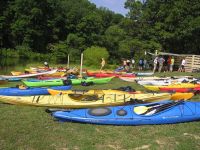 There's no way I would ever recommend a specific kayak for anyone. Kayak preferences are as personal as underwear. But there are some general considerations, which can help anyone find a kayak.
There's no way I would ever recommend a specific kayak for anyone. Kayak preferences are as personal as underwear. But there are some general considerations, which can help anyone find a kayak.
Not all kayaks are created equal. There are slow, clunky kayaks that aren't much fun to paddle. They get used a few times, and then abandoned. These short wide large cockpit boats are not good for much other than they are cheap. These boats are commonly referred to as bathtubs. It's like trying to pedal a clunker bicycle --despite best intentions you don't go far or stay with it. Good equipment makes a difference.
So here are my ideas for what they are worth:
Know yourself:
- What's most important to you?
- Do you want to go far and fast?
- Or are you content to paddle just far enough to see the sunset?
- Do you have good balance?
- Do you want performance from your kayak?
- Are you agile enough to get into, out of a tight cockpit?
- Do you paddle alone? Do you want to carry camping gear?
- Are you strong enough to load a kayak onto a car rack by yourself?
- What kind of kayaking are you going to want to do 1 year or 5 years down the road?
Know where you want to paddle. There's no such thing as an all-around kayak.
Do you paddle on rivers, ponds, small lakes, or large open water? The best boat for paddling on a quiet pond is not the best boat for a wild, whitewater river, over night on an Ozark river or the ocean. Decide where you paddle most and buy a boat for that. If it works in other situations, great. If not, rent when you need to (or own more than one kayak!)
Based on the above answers, you should be able to narrow your choices. A salesperson at a good paddling shop can help you narrow your choices. Generally, shorter boats are lighter, more maneuverable, slower and less seaworthy than longer ones. Wider boats tend to be more stable but harder to paddle. Longer boats are faster, heavier, handle bigger water and carry more gear. Smaller cockpits are harder to get into but aid performance once you are in. Sit-on-top-boats are fine for warm weather and water, but are poor choice for seasons other than summer and paddle slower than sit in boats. Plastic boats are heavier, cheaper; stand up to more abuse than composites (Personally, I think plastic boast are the only reasonable choice for rocky Ozark streams.)
Try as many kayaks as you can before your buy. I repeat, try as many kayaks as you can before you buy. Rent! Borrow! If someone has a used kayak for sale near you, ask if you can paddle it. Go to a paddling demo (Alpine shop holds many check their website) or buy from a shop that lets you get in the boat. If you buy a boat and eventually find isn't perfect for you, don't despair. There's a strong market for used kayaks. Just sell it and get another.
My personal choices? I like plastic kayaks in the 14- to 15-foot range, if you are only going to own one boat for pond, lake, rivers and ocean bay paddling. Years ago many started their paddling career in a stable, comfortable 13 to 14-foot Perception Carolina. Now the most frequent boat we see people getting now, are 12 - 14 foot Wilderness System Tsunamis. I did not particularly love either of these models for small rivers because they do not turn very fast. My personal preference is a Prijon Yukon Expeditions, but I know some people who hate it because of its tendency to want to turn and not track true. There are many boats that make excellent choice for our Ozark streams that you can overnight in such as the Jackson JmOld Town Castone or the Dagger Stratos If you want a boat only for large rivers or lakes you may want a 16 to 18 foot composite boat. Many people in the club love their QCC or a wood boat is an economical alternative to fiberglass, Kevlar, or carbon fiber boats. Take into account what you want to do now and later with your boat.
Now for whitewater there are as may choices as there are types of whitewater. There are play boats, down river boats, creek boats, race boats, and crossover boats. Again you need to decide what kind of boating you want to do and chose from there. Make sure if you are new to whitewater, that you choose a boat for beginners or you will be upside down and swimming often.
As you skills increase you do not want a boat that cannot keep up with your abilities and interest. You will want a boat that will allow you to have fun a wide variety of situations, or decide to buy many boats to meet those needs. Go to a store that will meet your needs. You want one that has knowledgeable sales staff that can answer all your questions. You want to see a wide variety of boats and ask many questions. Ask people who have the boat you are interested in and read reviews on websites such as eddy flower or paddling.net.
Finally you can try to buy a used boat. There is Craigslist, eBay, Boater Talk, and outfitters on the net or many clubs message boards. A word of caution, I bought a used boat on Craigslist and had to fix numerous holes that were drilled into the boat to add decking and a keel.

